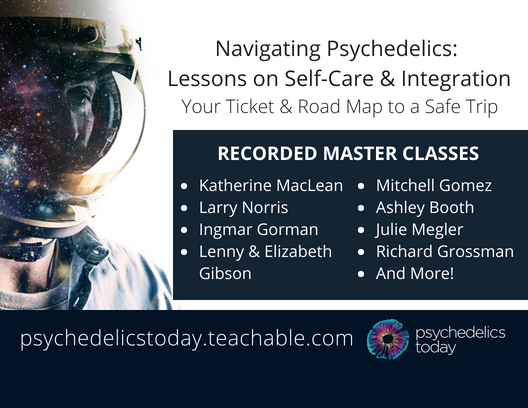Nov 20, 2018
In this interview, Brian Pace interviews Dr. Jason Slot at Ohio State University. In the show, they talk about Jason’s contributions of the psilocybe genus. Jason is in the faculty at OSU in the department of plant pathology.
3 Key Points:
- There are over 200 species of mushroom forming fungi that produce psilocybin, and Jason studies how and why these organisms produce the psychoactive compound.
- Animals seek altered states of consciousness as a potential evolutionary mechanism.
- Mushrooms use horizontal gene transfer to pass on their psychoactive properties.
Support the show
- Patreon
- Leave us a review on iTunes
- Share us with your friends – favorite podcast, etc
- Join our Facebook group - Psychedelics Today group – Find the others and create community.
Navigating Psychedelics
Show Notes
About Jason
- "There weren't many mycology job postings in the area, and a job came up for someone to study the evolution of fungal genomes" - Jason
- It all just fell into place
What is Neurochemical Ecology
- Ecology is the interaction among organisms and their interaction with their environment
- Neurochemical ecology is a special case where the chemicals are specifically targeted to processes of nervous systems in animals
- There is an opportunity for plants and fungi to produce drugs and compounds that manipulate their behavior or inhibit their eating
Species that Produce Psilocybin
- There are over 200 species of mushroom forming fungi that produce psilocybin
- Jason has found many more
Distribution of Psilocybe
- Mushrooms were anatomically modern
- There were flowering forests and wood that spanned to each of the poles
- The supercontinent would have broken up after that and as the continents separated, so did the mushrooms
- Humans have been distributing psilocybe through the dung of migrating animals
Columbian Exchange
- During colonization from the old world to the new world, there was the biggest exchange of fungi
- If the amount of biomass and dung expands, then the number of fungi species evolves and grows
- The underlying change in the climate that changes the planet from forested to open grasslands also has an impact
- During human evolution, psilocybe has been around the whole time
- These neurochemicals have dated human genus
Serotonin
- Serotonin is analogous to psilocybin
- Bacteria was the first organism making serotonin
- Insects produce serotonin
- “Serotonin is a great key, it fits into a lot of different locks and is used in a lot of different ways” - Jason
- It's in plants, its in amoebas, and its in animals
- In animals, they have specialized a lot of different receptors that respond to serotonin
- Serotonin only interacts with one type of receptor in the body
Altered States of Consciousness
- “It must be like something to be a bat, and it must be different than what it's like to be a human, what must it be like to be a bat under the influence of psilocybin, is it anything like a human?” -Brian
- Animals seek altered states of consciousness
- Bees seek out fermented grapes
- We have video footage of foxes taking huge bites out of Amanita Muscaria
- Seeking out intoxication is a natural human drive
- Maybe the desire to seek out these altered states of consciousness is an evolutionary mechanism that is happening
- If you search out new ways of perceiving the world, you may come upon a new pattern that your group of species learns how to live better
- If ants come back to the hive too drunk, they get punished and get bit
Language
- One of the ways humans distinguish ourselves
- We have specialized vocal chords, and tongues that make our language unique
- Terrence - Stoned Ape Theory - the thesis was that psilocybin mushrooms were a part of the diets of the hominids
- There was some kind of co-evolutionary relationship that may have resulted in human language
Psilocybin’s role in our development
- “What kind of role did psilocybin mushrooms play in our development?”
- The hominids came down from the trees and now they are standing upright
- We have to look at opportunity, constraints, etc.
- If the ape eats psilocybin, it may have an idea or understands its environment better
- It may help the ape acquire more food or expand into new territory
- The access to food and changes in locomotion are huge forces in our evolution
- Having fire to cook our meat and change our availability to nutrients is one of the biggest forces in evolution of human consciousness than mushrooms
Horizontal Gene Transfer
- Vertical transfer of information means from parent to offspring
- Horizontal transfer of genetic information happens between species
- One bacteria has a gene to resist an antibiotic, and another doesn't. One bacteria can obtain that gene from the antibiotic resistant bacteria (ex. Antibiotic-resistant staphylococcus)
- Gene transfer can happen in multicellular creatures like mushrooms
- Fungi are exchanging genes through different species
- Paneolis Mushrooms did not inherit the biosynthetic pathway to produce psilocybin, they received it from a totally different genera
KT Extinction
- A comet impact that caused havoc and climate change that resulted in the extinction of dinosaurs
- Mega herbivores, putting out tons of herbivore dung
- The genes to make psilocybin were acquired by a dung loving Paneolis from a dung loving Psilocybe
- Dung attracts flies, but it doesn't kill the insects that eat psilocybin
- Psilocybin is one of the safest drugs for consumption
- The amatoxin in Amanita Muscaria (The Destroying Angel, commonly mistaken with Matsutake), interrupts the central part of cellular metabolism
Identifying Genes in Psilocybin
- He sequenced 3 different species of mushrooms that make psilocybin, and then looked at one species that didn't make psilocybin
- They take two pieces of DNA and then compare them
- They all have those genes, but how did they get them?
- Validated the biosynthesis of psilocybin
- Mediated Horizontal Gene Transfer
- When fungi are under stress they take the DNA from their environment
Cicada Parasitism
- There are cicada pathogens that infect the cicadas before they emerge from their ‘underground’ and their rear end is transformed into these spore producing structures
- They fly around and drop their spores all over
- Are these plants or fungi are using any of these neurochemicals in house for cognition?
- Turing test - a computer can convince you that it's human
Link
Check out this FREE online course, "Introduction to Psychedelics"
About Jason

Jason Slot is an Evolutionary Biologist that studies topics in three major areas, the genomic and metabolic bases of fungal adaptation and niche, horizontal gene transfer mechanisms and the evolution of symbioses. He is in the Department of Plant Pathology at Ohio State University.
0 Comments
Adding comments is not available at this time.

